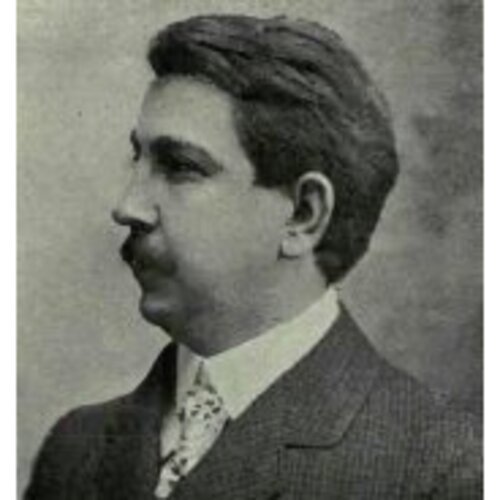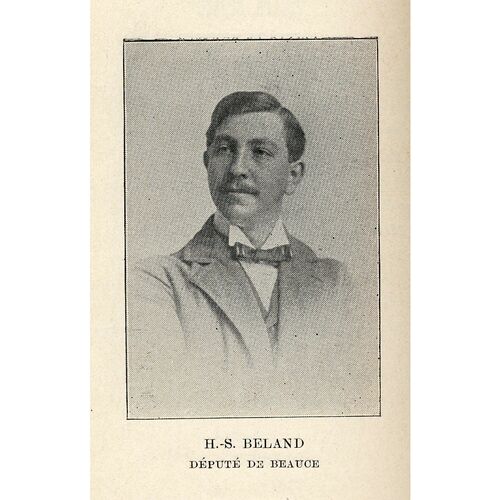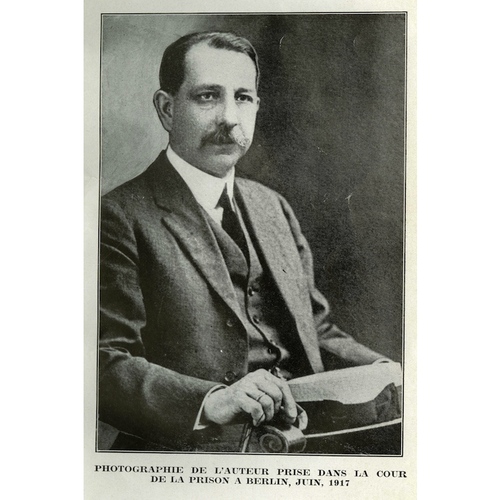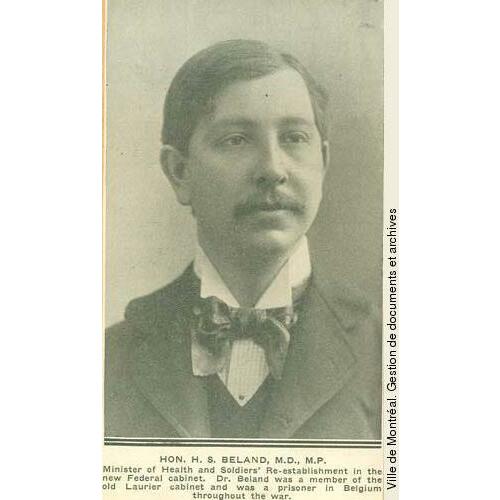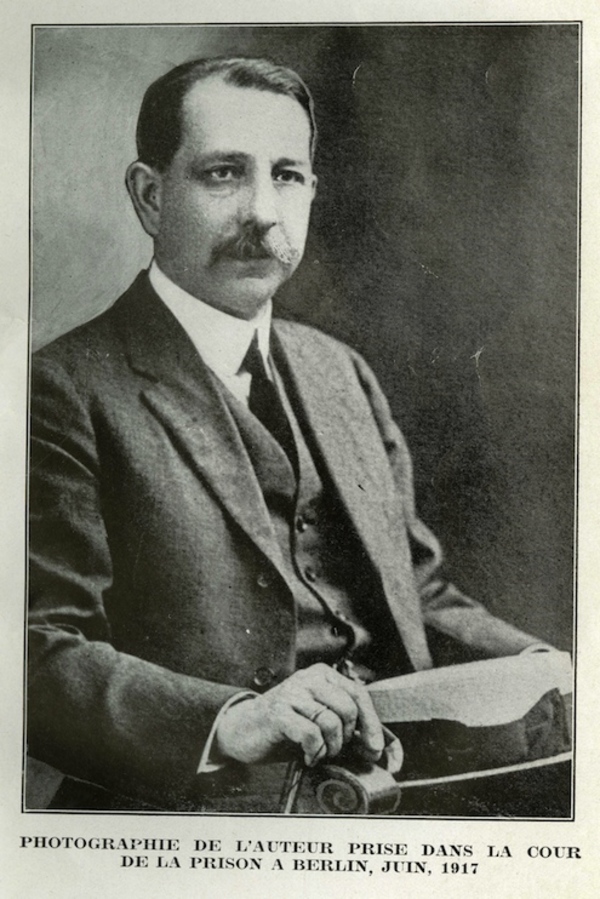
Source: Link
BÉLAND, HENRI (baptized Joseph-Henri-Sévère, he sometimes signed Henri-S. and was often referred to by the first names Henri-Sévérin or Henri-Séverin), physician and politician; b. 11 Oct. 1869 in Saint-Antoine-de-la-Rivière-du-Loup (Louiseville), Que., son of Henri Béland, a farmer, and Sophie Lesage; m. first 4 June 1895 Flore Gérin-Lajoie (d. 25 June 1908) in New Bedford, Mass., and they had at least three children; m. secondly in 1914 Adolphine Cogels (d. 1916 or 1917) in Belgium; m. thirdly 20 July 1922 Henriette Van Laethem in Ottawa; d. 22 April 1935 in Pittsburgh (Kingston), Ont., and was buried on the 26th in Saint-Joseph cemetery (Saint-Joseph-de-Beauce), Que.
After finishing his classical studies at the Séminaire de Saint-Joseph des Trois-Rivières, Henri Béland entered medical school at the Université Laval in Quebec City in 1889. He completed his medical program at the Université Laval in Montreal, where he received his md magna cum laude in 1893. He began practising in 1895 in Hinsdale, N.H., and subsequently settled in Saint-Joseph, where he continued to pursue his medical career. Very soon, however, he was drawn to politics: already, at university, he had sometimes skipped lectures to hear Premier Honoré Mercier* speak in the Legislative Assembly. From January 1897 to January 1899 he was the mayor of his municipality. Also in 1897, he became the Liberal mla for the constituency of Beauce. He was returned to the legislature by acclamation in 1900 and resigned on 7 Jan. 1902.
In a by-election the same day Béland was acclaimed as the mp for the federal riding of Beauce. He also retained his seat in the federal elections of 1904 and 1908. As well, in the summer of 1911 he agreed to run in Montmagny to replace the outgoing member, Cyrias Roy. On 19 August, as a result of a cabinet reshuffle during the election campaign, Béland became postmaster general and a member of the Privy Council of Canada. The Liberals lost to Robert Laird Borden’s Conservatives on 21 Sept. 1911. Béland himself won in Beauce but was defeated in Montmagny.
Shortly before the start of World War I, Béland was travelling in Europe with his second wife, Adolphine Cogels, whom he had just married. When Germany invaded Belgium the couple hastily went to Kapellen, near Antwerp, where Adolphine’s family owned Starrenhof Castle. Béland offered his services to King Albert I, and in August 1914 he began to treat the wounded at the Sainte-Élisabeth hospital. Despite the fact that Antwerp came under German bombardment on 10 October, he chose to remain at the castle with his wife. At the beginning of 1915 the couple had high hopes of obtaining permission to leave the country. On 3 June Béland was arrested and then detained at the Grand Hôtel in Antwerp. Three days later he would be on a train to Berlin bound for the Stadtvogtei prison, from which he would not be freed until 9 May 1918.
During his confinement, there were negotiations on the possibility of including Béland in a prisoner exchange, but no agreement was reached. Despite his numerous requests Béland was refused permission to go to his wife’s bedside at Kapellen, and he was only informed of her death two days after her burial. Since Sir Wilfrid Laurier* and Borden had agreed that the Unionists would not field a candidate against him in the election of 17 Dec. 1917, Béland was re-elected by acclamation. In March 1918 Great Britain proposed an exchange that Germany was to accept two months later. On 13 May, when news of his liberation broke, Liberal mp Rodolphe Lemieux interrupted the proceedings of the House of Commons to announce it. Once Béland was back in Saint-Joseph, a triumphant reception awaited him: a welcoming crowd of 10,000 people gathered on 4 August. The war over, his life gradually resumed its course, but it would never be the same. His closest acquaintances described him as thinner and weakened by his years of imprisonment. In 1919 Béland published, in Beauceville, his account of that difficult experience, Mille et un jours en prison à Berlin (brought out that year in Toronto as My three years in a German prison).
In the federal general election of 6 Dec. 1921, Béland again ran in the riding of Beauce. He scored a resounding victory with a majority of 10,695 votes over his Conservative opponent, J.‑Ephrem Lambert. On 29 Dec. 1921 he was appointed minister of soldiers’ civil re-establishment and minister of health. In this capacity he represented Canada at the hygiene congress in Paris, which ran from 21 to 24 Oct. 1924. The following month he took part in the First Opium Conference of the League of Nations, held in Geneva. On 5 Sept. 1925 Béland became senator for the division of Lauzon, but he remained a member of the cabinet until 14 April 1926.
Béland won more than his share of honours. In 1920 he received the title of commander of the Order of the Crown of Belgium for his services during World War I. In November 1924 the same nation awarded him the title of grand officer, with a silver star. In July 1928 the Roman Catholic Church named him commander of the Order of St Gregory the Great. From 1930 to 1935 he was the honorary colonel of the Régiment de Beauce, which became the Régiment de Dorchester et Beauce in 1932.
On 22 April 1935 Béland and Henriette Van Laethem, whom he had married in 1922, left Kingston, Ont., by car for Ottawa. When he arrived in Pittsburgh, he fainted, and he died a short time later. His remains were taken to Ottawa, and then to Saint-Joseph by special train for the funeral service. He was buried in the parish cemetery with his first wife, who had died in childbirth.
As the elected parliamentary representative for Beauce for 29 years and a senator for 10, Henri Béland had a distinctive political career. His death evoked expressions of sympathy in Canada and elsewhere. Despite his duties and his frequent travels abroad, Béland spent his summers at his house in Saint-Joseph. For the people of La Beauce, he was a respected figure who, because of his courage and determination, was a credit to the region, the province, and the whole country.
Despite extensive research, the certificate for Henri Béland’s second marriage has not been found. However, a note added to the registry of baptisms (in the left margin of the page where Béland’s baptism is recorded) gives this information: “married in [a] second wedding Eufémia Adolphi M. H. Veef. 14 July 1914; in the church of St Jacques parish, Belgium. J. N. T. Ptre, curé.”
AO, RG 80-5-0-1298, no.8203. BANQ-MCQ, CE401-S15, 11 oct. 1869. BANQ-Q, P4; P198. FD, Saint-Joseph-de-Beauce, Québec, 29 juin 1908, 26 avril 1935. LAC, R112-146-8, file SF-18-26; R188-39-8, files 1922-2249, 1924-437; R194-40-3, files 167945, 204890, 211469; R219-100-6, files 1911-865, 1914-1735, 1915-729-C, 1925-45; R6113-0-X; R7207-0-X; R10383-0-6; R10811-0-X; R14423-0-6. Mass., Office of the Secretary of State, Arch. Div. (Boston), Record of marriage, 19 June 1895. L’Action catholique (Québec), 23 avril 1935. Le Devoir, 23 avril 1935. L’Éclaireur (Beauceville, Québec), 10 déc. 1908; 14 janv. 1909; 3, 17 août, 14 sept. 1911; 16 mai, 8 août 1918; 22 sept., 1er déc. 1921; 1er nov. 1924; 21 janv., 21 mai 1925; 19 juill. 1928; 15 mai, 10 juill. 1930; 25 avril, 2 mai 1935. Globe, 23 April 1935. Le Soleil, 18, 30 juill. 1918; 22 août 1921; 23, 24, 25 avril 1935. Can., House of Commons, Debates, 1905, 1907–14, 1918–23, 1925. Jacques Castonguay et Armand Ross, Le régiment de la Chaudière (Lévis, Québec, 1983). René Castonguay, Rodolphe Lemieux et le Parti libéral, 1866–1937: le chevalier du roi (Sainte-Foy [Québec], 2000). DPQ. P.‑C. Poulin, “La recherche de héros: l’exemple de Henri-Séverin Béland (1869–1935),” in Histoire de Beauce-Etchemin-Amiante, Serge Courville, édit. (Sainte-Foy, 2003), 606–15. P.‑G. Roy, La dixième législature de Québec: galerie des membres du Conseil législatif et des députés à l’Assemblée législative (Lévis, 1901); La législature de Québec: galerie des membres du Conseil législatif et des députés à l’Assemblée législative (Lévis, 1897). J. F. Vance, “Dr. Henri Béland: nobody’s darling,” American Rev. of Canadian Studies (Washington), 28 (1998): 469–87.
Cite This Article
Pierre C. Poulin, “BÉLAND, HENRI (baptized Joseph-Henri-Sévère) (Henri-S., Henri-Sévérin, Henri-Séverin),” in Dictionary of Canadian Biography, vol. 16, University of Toronto/Université Laval, 2003–, accessed December 31, 2025, https://www.biographi.ca/en/bio/beland_henri_16E.html.
The citation above shows the format for footnotes and endnotes according to the Chicago manual of style (16th edition). Information to be used in other citation formats:
| Permalink: | https://www.biographi.ca/en/bio/beland_henri_16E.html |
| Author of Article: | Pierre C. Poulin |
| Title of Article: | BÉLAND, HENRI (baptized Joseph-Henri-Sévère) (Henri-S., Henri-Sévérin, Henri-Séverin) |
| Publication Name: | Dictionary of Canadian Biography, vol. 16 |
| Publisher: | University of Toronto/Université Laval |
| Year of publication: | 2016 |
| Year of revision: | 2016 |
| Access Date: | December 31, 2025 |


